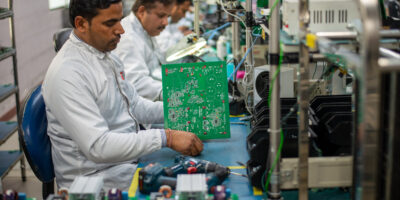
Here’s how India is turning the US-China chip war into its advantage(Photo by Arun SANKAR / AFP)
Foxconn, Vedanta join hands to manufacture semiconductors in India
- According to the MOU signed between the two companies, Vedanta will hold the majority of the equity in the JV, while Foxconn will be the minority shareholder.
- This first-of-its-kind joint venture between the two companies will support the Indian Prime Minister’s vision to create an ecosystem for semiconductor manufacturing in India.
For years, India has held a fairly small presence in the global semiconductor arena. However, in the wake of the Covid-19 pandemic, the country decided to change that. Two years into the pandemic, it’s safe to say that the country has recorded an impressive amount of progress within its local semiconductor industry. Today, even iPhone assembler Foxconn has plans to build a chip plant in India.
For context, India has been opening its doors for semiconductor manufacturing companies to set up their fabs there, as a means to help solve the global supply chain chip crisis. The country currently relies on chip imports from Taiwan, Singapore, Hong Kong, Thailand, and Vietnam.
Taiwanese company Foxconn is the first major foreign tech manufacturer to respond to India’s call to bring chip production onshore. For that, Foxconn made a pact with Indian natural resources conglomerate Vedanta to set up a joint venture (JV) and build a chip plant.
For the project, Foxconn will invest US$118.7 million and hold a 40% share, according to iPhone assembler. Vedanta Chairman Anil Agarwal will hold the chairman position for the venture. The JV is aimed at meeting massive demand from the local electronics industry.
Vedanta is India’s largest aluminum producer, a leading supplier of oil and gas and also has interests in telecom. The deal with Foxconn marks the second attempt of Vedanta to enter the semiconductor space after its earlier plans to set up a display unit could not take off.
Foxconn in a statement said that “This first-of-its-kind joint venture between the two companies will support Indian Prime Minister Narendra Modi’s vision to create an ecosystem for semiconductor manufacturing in India.” Reports from local media suggest that Foxconn is also one of the first large tech manufacturers to support Modi’s “Make in India” campaign for boosting domestic manufacturing, having built several production hubs in the country.
“It will provide a significant boost to domestic manufacturing of electronics in India. Discussions are currently ongoing with a few state governments to finalize the location of the plant,” the statement said. The collaboration between Vedanta and Foxconn came shortly after the government’s recent policy announcement for electronics manufacturing and PLI scheme for incentivising organizations to contribute towards the development of this sector.
“This will be the first joint venture in the electronics manufacturing space after the announcement of the policy,” the statement added. The new incentives package is aimed at creating a comprehensive ecosystem for semiconductor chip design, packaging and manufacturing that can attract global investment. The funding will be provided over a period of six years.
Prior to this, the Indian government has also approved a US$ 10 billion incentive plan to attract semiconductor companies to build and operate their plants in the subcontinent, as part of its plans to establish India as a global electronics production hub. What this means is, India will extend financial support of up to 50% of a project’s cost to eligible manufacturers.
The Indian government has already started accepting proposals from international chip manufacturers beginning this year. Some of the companies that have shown interest in this new opportunity include Israel’s Tower Semiconductor, TSMC, Foxconn, United Microelectronics Corp, Fujitsu as well as Intel and AMD.
READ MORE
- Ethical AI: The renewed importance of safeguarding data and customer privacy in Generative AI applications
- How Japan balances AI-driven opportunities with cybersecurity needs
- Deploying SASE: Benchmarking your approach
- Insurance everywhere all at once: the digital transformation of the APAC insurance industry
- Google parent Alphabet eyes HubSpot: A potential acquisition shaping the future of CRM


